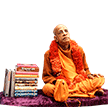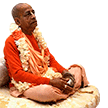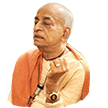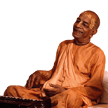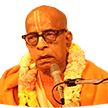Fearfulness - an essential subject: Difference between revisions
(Created page with "Category:Essential Subjects <!----------------------- edit below this line -----------------------> <!------------------------ begin introduction text below --------------...") |
(Vanibot #0041: Moves Choose Another box to the end) |
||
| Line 2: | Line 2: | ||
<!----------------------- edit below this line -----------------------> | <!----------------------- edit below this line -----------------------> | ||
<!------------------------ begin introduction text below ------------------------> | <!------------------------ begin introduction text below ------------------------> | ||
One cannot be fearless unless one is fully in Kṛṣṇa consciousness. A conditioned soul is fearful due to his perverted memory, his forgetfulness of his eternal relationship with Kṛṣṇa. The Bhāgavatam (11.2.37) says, bhayaṁ dvitīyābhiniveśataḥ syād īśād apetasya viparyayo 'smṛtiḥ. Kṛṣṇa consciousness is the only basis for fearlessness. Therefore, perfect practice is possible for a person who is Kṛṣṇa conscious. And since the ultimate goal of yoga practice is to see the Lord within, a Kṛṣṇa conscious person is already the best of all yogīs. The principles of the yoga system mentioned herein are different from those of the popular so-called yoga societies. | |||
Srila Prabhupada's books, lectures, conversations and letters offer a comprehensive presentation of this essential subject as seen in the Vaniquotes '''[[Vaniquotes:Category: | Srila Prabhupada's books, lectures, conversations and letters offer a comprehensive presentation of this essential subject as seen in the Vaniquotes '''[[Vaniquotes:Category:Fearfulness|Fearfulness]]''' category. An introduction from his books is given below in the following 8 quotes. | ||
<!-------- end introduction text and don't touch next three lines ---------> | <!-------- end introduction text and don't touch next three lines ---------> | ||
== Quotes from Srila Prabhupada's books == | == Quotes from Srila Prabhupada's books == | ||
<!----------------- edit quote boxes below this line -----------------> | <!----------------- edit quote boxes below this line -----------------> | ||
{{VaniQuotebox| | {{VaniQuotebox|A devotee is never fearful of his death, for he meditates on the Supreme Personality of Godhead always, not for any material profit, but as his duty. The Lord, however, knows how to protect His devotee|As a pure devotee, Mahārāja Ambarīṣa, although in such danger, did not move an inch from his position, nor did he request the Supreme Personality of Godhead to give him protection. He was fixed in understanding, and it was certain that he was simply thinking of the Supreme Personality of Godhead in the core of his heart. A devotee is never fearful of his death, for he meditates on the Supreme Personality of Godhead always, not for any material profit, but as his duty. The Lord, however, knows how to protect His devotee. '''(Śrīmad-Bhāgavatam 9.4.48)'''}} | ||
{{VaniQuotebox| | {{VaniQuotebox|A fearful black demon (Virabhadra) as high as the sky and as bright as three suns combined was created (by Lord Siva), his teeth very fearful and the hairs on his head like burning fire| | ||
A fearful black demon as high as the sky and as bright as three suns combined was thereby created, his teeth very fearful and the hairs on his head like burning fire. He had thousands of arms, equipped with various weapons, and he was garlanded with the heads of men. '''(Śrīmad-Bhāgavatam 4.5.3)'''}} | |||
{{VaniQuotebox| | {{VaniQuotebox|A human being should eat prasada offered to the Deity and should enjoy sex life according to the Vedic injunctions. He should engage himself in the business of Krsna consciousness, he should save himself from the fearful condition of material existence|The Vedic injunctions therefore warn, nāyaṁ deho deha-bhājāṁ nṛloke kaṣṭān kāmān arhate vid-bhujāṁ ye (SB 5.5.1). One should not enjoy sex life like hogs, and eat everything, even to the limit of stool. A human being should eat prasāda offered to the Deity and should enjoy sex life according to the Vedic injunctions. He should engage himself in the business of Kṛṣṇa consciousness, he should save himself from the fearful condition of material existence, and he should sleep only to recover from fatigue due to working hard. '''(Śrīmad-Bhāgavatam 7.13.26)'''}} | ||
{{VaniQuotebox| | {{VaniQuotebox|A sane person, by attaining old age, will become fearful of death. Foolish people engage in material activities as if they will live forever and enjoy material advancement, but actually there is no material advancement|Actually the supreme controller is the Personality of Godhead, Kṛṣṇa, and everyone is His servant. Yavana-rāja, the King of the Yavanas, was also a servant of Kṛṣṇa. Consequently, he wanted to execute the purpose of Kṛṣṇa through the agency of Kālakanyā. Although Kālakanyā means invalidity or old age, Yavana-rāja wanted to serve Kṛṣṇa by introducing Kālakanyā everywhere. Thus a sane person, by attaining old age, will become fearful of death. Foolish people engage in material activities as if they will live forever and enjoy material advancement, but actually there is no material advancement. '''(Śrīmad-Bhāgavatam 4.27.27)'''}} | ||
{{VaniQuotebox| | {{VaniQuotebox|Apparently a devotee may grow old, but he is not subjected to the symptoms of defeat experienced by a common man in old age. Consequently, old age does not make a devotee fearful of death, as a common man is fearful of death|Apparently a devotee may grow old, but he is not subjected to the symptoms of defeat experienced by a common man in old age. Consequently, old age does not make a devotee fearful of death, as a common man is fearful of death. When jarā, or old age, takes shelter of a devotee, Kālakanyā diminishes the devotee's fear. A devotee knows that after death he is going back home, back to Godhead; therefore he has no fear of death. Thus instead of depressing a devotee, advanced age helps him become fearless and thus happy. '''(Śrīmad-Bhāgavatam 4.27.24)'''}} | ||
{{VaniQuotebox| | {{VaniQuotebox|By prowess one can avoid fearfulness|By practice of yoga one can control hunger, and worldliness can be avoided by culturing the knowledge of impermanence. Dizziness can be conquered by rising up, and false arguments can be conquered by factual ascertainment. Talkativeness can be avoided by gravity and silence, and by prowess one can avoid fearfulness. Perfect knowledge can be obtained by self-cultivation. One must be free from lust, avarice, anger, dreaming, etc., to actually attain the path of salvation. '''(Śrīmad-Bhāgavatam 1.9.27)'''}} | ||
{{VaniQuotebox| | {{VaniQuotebox|Dhrtarastra became very fearful about the influence of the holy place on the outcome of the battle. He knew very well that this would influence Arjuna and the sons of Pandu favorably, because by nature they were all virtuous|Dhṛtarāṣṭra became very fearful about the influence of the holy place on the outcome of the battle. He knew very well that this would influence Arjuna and the sons of Pāṇḍu favorably, because by nature they were all virtuous. Sañjaya was a student of Vyāsa, and therefore, by the mercy of Vyāsa, Sañjaya was able to envision the Battlefield of Kurukṣetra even while he was in the room of Dhṛtarāṣṭra. And so, Dhṛtarāṣṭra asked him about the situation on the battlefield. '''(Bhagavad-gītā 1.1)'''}} | ||
{{VaniQuotebox|Excessive attachment for material things puts a man in such a bewildering condition of existence. Such fearfulness and loss of mental equilibrium take place in persons who are too affected by material conditions|Due to his impatience, Arjuna was unable to stay on the battlefield, and he was forgetting himself on account of this weakness of his mind. Excessive attachment for material things puts a man in such a bewildering condition of existence. Bhayaṁ dvitīyābhiniveśataḥ syāt (SB 11.2.37): such fearfulness and loss of mental equilibrium take place in persons who are too affected by material conditions. '''(Bhagavad-gītā 1.30)'''}} | |||
<!----------------- edit quote boxes above this line -----------------> | <!----------------- edit quote boxes above this line -----------------> | ||
''' | '''Fearfulness - [[Vaniquotes:Category:Fearfulness|explore more within this category]]'''. | ||
{{EsentialSubjectTotal}} | |||
{{ | <div style="float:left;"> | ||
{{EssentialSubjectnav}} | |||
</div> | |||
__NOTOC__ | __NOTOC__ | ||
__NOEDITSECTION__ | __NOEDITSECTION__ | ||
Latest revision as of 16:22, 22 November 2020
One cannot be fearless unless one is fully in Kṛṣṇa consciousness. A conditioned soul is fearful due to his perverted memory, his forgetfulness of his eternal relationship with Kṛṣṇa. The Bhāgavatam (11.2.37) says, bhayaṁ dvitīyābhiniveśataḥ syād īśād apetasya viparyayo 'smṛtiḥ. Kṛṣṇa consciousness is the only basis for fearlessness. Therefore, perfect practice is possible for a person who is Kṛṣṇa conscious. And since the ultimate goal of yoga practice is to see the Lord within, a Kṛṣṇa conscious person is already the best of all yogīs. The principles of the yoga system mentioned herein are different from those of the popular so-called yoga societies.
Srila Prabhupada's books, lectures, conversations and letters offer a comprehensive presentation of this essential subject as seen in the Vaniquotes Fearfulness category. An introduction from his books is given below in the following 8 quotes.
Quotes from Srila Prabhupada's books
Fearfulness - explore more within this category.
Vanipedia has now over 903 introductory articles compiled from Srila Prabhupada's books under the series titled Essential Subjects. All these articles can be seen in the Table of Content on the right side of this article and also here in this Umbrella Category. Browse through them to relish the breadth and depth of Srila Prabhupada's teachings - There is a subject for everyone.
